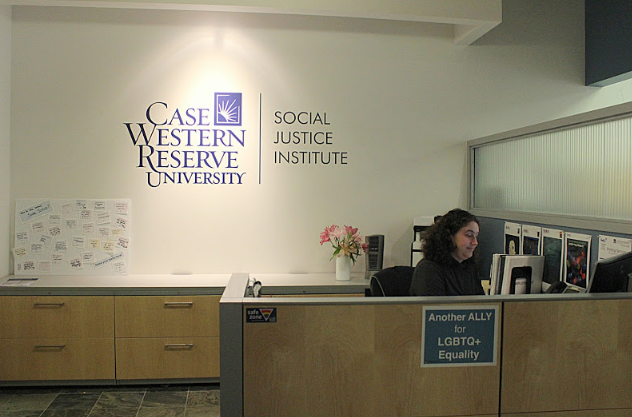The Social Justice Institute: six years dedicated to equality
The Social Justice Institute is located in the basement of Crawford Hall.
December 2, 2016
Inclusiveness and diversity are two of Case Western Reserve University’s core values outlined in the Strategic Plan. The Social Justice Institute (SJI), an on-campus organization, is leading the charge on this end, with the mission statement of “working toward equal access to opportunity for all people through understanding and addressing the root causes of social injustice and developing innovative solutions.” Founded in 2010, SJI is now looking into increasing its visibility among students.
The organization was founded by Director Rhonda Williams in 2010, in collaboration with the CWRU administration, to focus on issues of diversity and equality. Williams pitched the idea in 2008 while serving on the CWRU Strategic Planning Team. Hoping to address two of the Strategic Plan’s core values, inclusiveness and diversity, Williams felt the need to explore a field beyond science, technology, engineering and mathematics, and social justice was fitting as both a real-world and academic pursuit that could address this need. With support from President Barbara R. Snyder, the College of Arts and Sciences and Office of the Provost, SJI was created.
SJI has been very active in its years here at CWRU. It has pushed for social justice initiatives by hosting events and promoting education, collaboration and research. One notable accomplishment of SJI was the creation of the Social Justice minor last year. The minor consists of core courses and electives that cover materials including the history and practice of social justice, the distribution of power, resources and opportunities and appropriate remedies for social inequality. The classes are given by multiple departments, promoting interdisciplinary study and a focus on diverse voices. In the future, SJI hopes that the minor can be expanded into a major and can include both graduate and professional courses.
SJI also hosts teach-in workshops to respond to social events and issues that occur throughout the community as they arise. For example, in 2014, a series of workshops were hosted in response to the shooting of Tamir Rice, a 12-year-old boy who was shot outside the Cudell Recreation Center by a police officer. More recently, SJI serves as a key mediator in many discussions sparked by the results of the presidential election. These workshops act as a “first-response” to emerging changes, with the goal of quickly and efficiently promoting dialogue of the event.
The biennial Think Tank is one of SJI’s signature events. The first occurred alongside the public launch of SJI in 2010 and covered themes like race, social justice and profiling. The latest event, Think Tank 2015, was a major success for SJI, seeing an attendance of nearly 1,000 students, faculty and community members in a three-day conference to promote discussion on social justice issues.
While SJI continues to carry out activities that will accomplish the goals laid out in their mission statement, promoting visibility is also an important objective moving forward. Reaching out to the student body is one goal that SJI is striving for. To this end, SJI has been collaborating with student groups on campus that have goals and activities centered on social justice. These student groups, following an application and selection process, are recognized as SJI-Supported Student Groups. This distinction comes with benefits, including logistical assistance for student events, access to SJI staff consultation for planning and increased publicity via the SJI website and mailing list.
The outreach does not just extend to student groups. Undergraduate and graduate students are free to join social justice research fellowships. Students can also receive scholarships for attending social justice conferences. These options have already engaged a few students in activities that promoted social justice initiatives and discussion, with some travelling to Michigan and Illinois for past conferences.
“Social Justice ought to be a part of every conversation,” says Williams. “We need to find ways to make a difference, train social justice champions, and this means having hard conversations, changing the way we think through imagination and learning and engaging in the world.”


